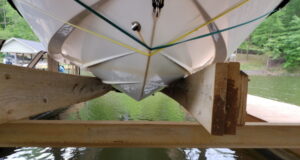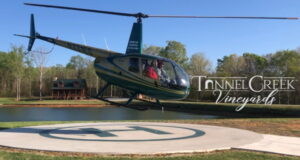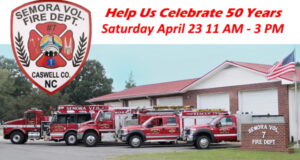J.W. Shelton Auctions
South Boston, Virginia
By Phyliss Boatwright
The history of South Boston’s J.W. Shelton Auction and Realty began in 1955 and includes a lot of knowledge and skill passed down from one generation to the next. It also entails much more than the average auction attendee probably realizes.
Current owner Sam Watts worked under the original owner, J.W. Shelton for years, learning first-hand how to run every aspect of the business. Sam didn’t plan to become an auctioneer, but, according to Wanda Jennings, Sam “followed Mr. Shelton around and saw what it was like” and got the itch.
What followed was auctioneering school and a three-year apprenticeship under J.W. Shelton. By the early 1990s, Sam had become the owner of the business, retaining its well-known and respected name. Shelton, by then getting up in age, stayed on and worked into his 80s, Wanda told me with obvious respect.

J.W. Shelton Auction and Realty owner Sam Watts calls for bids at an estate auction in Nathalie, Va. summer 2021.
Decades later, Sam and Wanda found themselves nurturing and encouraging young Tyler Crute, who now serves as an auctioneer part-time, working around his career as a Halifax County deputy sheriff. Wanda said Tyler started hanging out with Sam on the farm when Tyler was a young boy, and was bitten by the auctioneer bug.
With history seemingly repeating itself, Tyler went to auctioneering school and then, after passing a four-hour state exam, began working under Sam. I had no idea there was so much work involved in obtaining an auctioneer’s license or that it took so much to keep it. Auctioneers also have to participate in a certain amount of continuing education every other year, and regularly pass more tests in order to maintain their license.
I confess, this piqued my curiosity, so I looked up the Virginia laws pertaining to auctioneering, and discovered that not just any old anyhoo can become an auctioneer. He or she must have the education and training, of course, but also be bonded and have a clean criminal record. I also visited the Virginia Department of Professional and Occupational Regulation (DPOR) and looked up the regulations for auctioneering schools. Wow! According to the DPOR website, auctioneering schools “must offer to Virginia candidates a minimum of 80 hours of classroom and field instruction in the conduct of auction business to include fundamentals of auctioneering, elementary principles of real estate, brokerage, contract drawing, advertising, sale preparation, bid calling, settlement statements, ethics and exposure to the current rules and regulations of the Virginia Auctioneers Board. There must be at least five instructors who have been licensed auctioneers for at least five years and who specialize in different fields of the auction business.” In other words, it’s serious business.
Talking to Wanda, both during an actual auction and later in a phone conversation, I got a real sense of just how serious it is. Being an auctioneer is much more than the “chant” we all know and enjoy hearing. Watching Sam and Tyler at an auction in Nathalie, Va. last summer, I kept thinking how much an auctioneer has to think about at once. They have to keep up the chant, while also watching for bids and paying attention to the crowd and the items they’re auctioning. Wanda explained that they also must have a feel for the bidders and be mindful of how much to raise the bid each time.
“You have to know how much and when to up the bid,” she said, “so you don’t throw people off.” Wanda told me that the ultimate goal of every auction is to get the best possible price for the client.
Auctioneering takes good people skills as well. When I asked Wanda to relate an odd thing that happened during an auction, she related Sam’s story of an older man and wife engaged in an obvious disagreement about bidding. The wife was making bids on a parcel of land, and when she would place a bid, her husband would hit her on the head with his cane. It ended up in a full-fledged brawl, with cursing and people attempting to pull the couple apart.
As a rule, however, said Wanda, family disagreements are the saddest thing about auctions. “When the family doesn’t agree, and they are fighting among themselves, we hear different stories from different people” and it makes it difficult.
On the other hand, though, she said it is most rewarding when the auction brings more than the seller asked for. “It makes them happy,” she said, and in turn brings the company satisfaction. She said lately, many auctions have exceeded expectations. This year, since Covid has affected almost every aspect of life, she said, many people are eager to get out of cities and the north, and move to the more temperate Virginia/North Carolina climate. Many are also searching for rural homes and land where they can escape city crime and grow their own food. She said folks are “coming from everywhere” to the Halifax County area. Recently, J.W. Shelton has served real estate clients from Connecticut, New York, New Jersey, Vermont, and Indiana, to name a few areas, she said.
Families choosing to grow their own food and have small farms have driven up the demand for farm equipment, Wanda said. That happens to be Sam’s favorite thing to auction. After the bulk of tobacco farming left the region, demand for farm equipment decreased drastically, but it is now making a comeback, she explained.
Wanda said J.W. Shelton auctions farms, farm equipment, land, personal property, estates, and occasionally antiques, although that market has gone down drastically over the past few years. She said younger people don’t seem to value real wood furniture as much as older generations.

Tyler Crute became an auctioneer after hanging out on the farm with J.W. Shelton owner Sam Watts and being bitten by the auctioneering bug.
I asked her to walk me through a typical estate auction, like the one I went to in Nathalie last summer. Once again, I had no idea how much went into it. I have to explain that last summer was the first time I’d attended an auction since I was quite young, and that has been a minute.
Wanda told me that for at least 30 days prior to the auction, the company is making lists and getting pictures and placing ads on auctionzip.com and in local newspapers. The company also has to line up clerks to write down bids and handle the money on auction day. Groundspeople, who hold up smaller items and catch bids, also have to be recruited. Wanda said, “We also have to be sure we have change and food on site on the day of the auction.” Equipment like bobcats must be on hand to move heavy items. There are a lot of logistics to deal with.
When the auction ends, the company can’t leave the site until all sale items are gone, or arrangements have been made to pick up the remainders.
After the auction, Wanda said, the company has a week to tally the records and pay the client. Meticulous records are kept, and she has to be sure all cash is accounted for and all checks have cleared. To get the final tally, she said, “I check it this way, crossways, and upside down to make sure it’s right.”
Given my newfound respect for and awe of auctioneering, I asked if Sam had advice for anyone considering going into the business. He said it is a “great business. You meet a lot of interesting people and get to sell a lot of interesting things. It’s always different and always an experience.”
And I thought those attending the auctions had all the fun.
1048 Bill Tuck Highway
South Boston, Virginia
(844) 572-4647
www.sheltonauction-realty.com
Serving the Southside Virginia area, North Carolina and other areas of Virginia.
Phyliss Boatwright is a journalist who for years reported Person County news in The Courier-Times. She has published two books and several short stories. Her book review show, Turn the Page, can be heard on WKRX, 96.7. For the past 10 years, she has taught journalism and served as public information officer at Roxboro Community School. She can be reached via email at phylissboatwright@gmail.com.
 Happy Endings Publications Hyco Lake, River City Area & SoBo Halifax Magazines
Happy Endings Publications Hyco Lake, River City Area & SoBo Halifax Magazines













